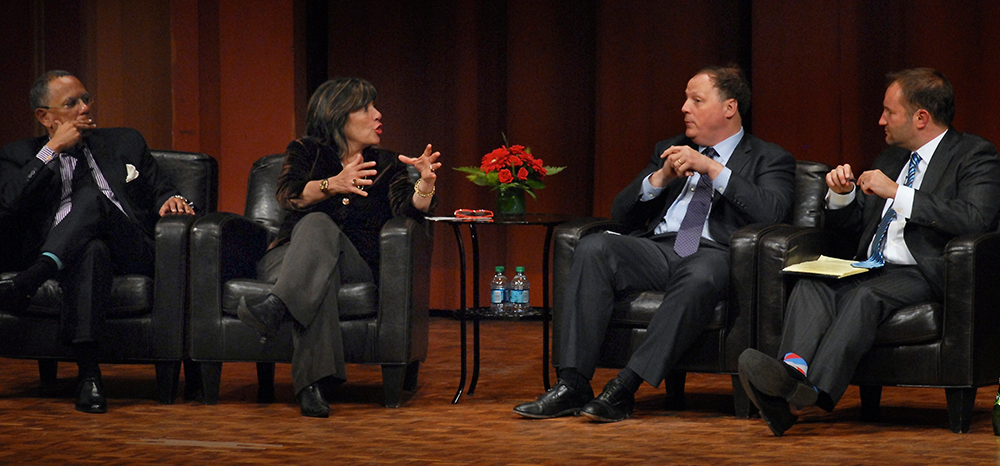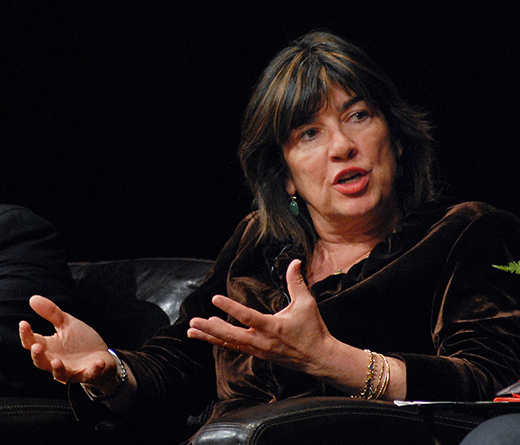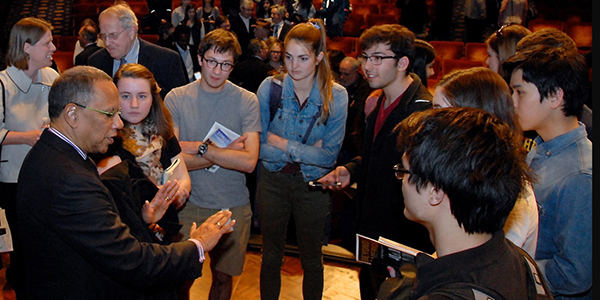
By STEVE FRIESS ’12
Pushing back against those who insist that the media and its American audiences are unserious and myopic, four of journalism’s top leaders used an April 15 forum honoring outgoing Wallace House Director Charles Eisendrath to insist foreign news has actually never been so relevant, popular or well-executed.
Practices are evolving as new technology provides opportunities for traditional print, TV and radio outlets to learn and deploy one another’s disciplines, New York Times Executive Editor Dean Baquet acknowledged to an audience of nearly 1,000 at Rackham Auditorium and those watching online. Despite the cutbacks, the result of that transformation is that “foreign reporting is far better today than it’s ever been.”
“I walk into a newsroom every day that not only has the great foreign correspondents but also has a huge video unit that thinks about things differently,” Baquet said emphatically. “There is so much immediacy now. After the Paris attacks, I’m competing not only with my traditional competitors like CNN but with The Guardian. I’m competing minute-by-minute with the European papers in the countries that are under attack. For all the difficulties, it’s better than it ever was.”
Baquet sat beside CNN’s Chief International Correspondent Christiane Amanpour and POLITICO’s co-founder and editor-in-chief John Harris as NPR’s “Morning Edition” co-host David Greene moderated the 90-minute discussion titled “Beyond America: The Case for Foreign News.” University of Michigan President Mark Schlissel introduced the quartet, all of whom are Livingston Award judges.
Before turning the stage over to the speakers, Schlissel paused to recognize Eisendrath for his four decades of contributions to the university and to the profession of journalism.
“We are able to celebrate this afternoon among so many top journalists and supporters because of Charles’ singular determination,” Schlissel said. “One of Charles’ great talents is his ability to see the university holistically and as such has had an incredible knack for finding those experiences that would enrich the Fellows’ time with us. Charles is also always willing to share his own expertise and he’s a wonderful ambassador for the university.”
As the discussion ensued, the panelists began assessing the state of affairs for international coverage. Harris, whose company last year launched POLITICO Europe and won praise for its coverage of the Brussels terror attacks in March, questioned the premise of the event’s title and, in fact, what precisely qualifies as “foreign news.”
“There is no important issue domestically that doesn’t have an international dimension,” Harris said. “If there was an attack on midtown Manhattan or Washington D.C. of the sort that happened in Brussels … is that an international story or a local story?”

That’s not to say there aren’t problems and concerns. Amanpour, who came to prominence after covering the Persian Gulf War and whose work covering the Bosnian War earned a Livingston Award in 1992, expressed frustration with major news outlets slashing budgets for overseas reporting and bemoaned the fact that the areas on the globe where journalistic attention is most needed are also where it is most difficult to find out what’s happening.
The backlash, she said, proves that “foreign news is so important that very important people want to shut us up. So, ISIS is cutting our throats. Governments don’t give us visas to go in. Militias make reporting difficult. Other governments shut us out by drumming up false charges or putting us in prison. We have to double down on foreign coverage and sending people out there.”
It’s not just foreign governments. Baquet pointed out that because even the United States now wages war using drones, illegal prisons and undercover operations, “We know much less about where the United States is engaged than we have in recent memory.”
Still, Baquet insisted, the public thirsts for the insights and information that outlets spend millions of dollars gathering and presenting. Long-form pieces and reports from such places as Europe and the Middle East are often the best-read Times articles, he said. “The dirty secret is that people always wanted foreign news,” he said. Alluding to the forum’s title, he continued, “I don’t actually think there’s much of a debate anymore. It’s the most important public-service oriented news we cover.”
Even so, Greene noted that as news organizations have closed their foreign bureaus over the two past decades, Harris is expanding POLITICO in Europe. POLITICO’s audience, Harris reasoned, “knows that the world is closer and has said ‘if you do something in Europe, count us in.'”
Some audience members, however, challenged the panel’s sunny view of the state of foreign news and Americans’ appetite for it. During a Q-and-A period, KWF ’12 Aisha Sultan of the St. Louis Post-Dispatch asked the group why the U.S. media seems to go to saturation coverage for terror attacks that occur in Europe but not, for instance, Pakistan.
Amanpour admitted that this troubles her as well: “We don’t have the resources to do that kind of wall-to-wall coverage everywhere these things happen. But then, should we be doing that kind of wall-to-wall coverage anywhere on just one story? It does raise quite a lot of issues.”
Greene and Baquet noted that part of the issue is how newsworthy the incidents are – attacks in Pakistan are very common but quite rare in France or Belgium – and what sort of access is even possible. The Times, Baquet said, has been kicked out of Pakistan but has dozens of reporters across Europe able to pivot to a major story there.
“We covered the Paris attacks by sending our entire show there and hosting it there for an entire week,” Greene recalled. “We couldn’t do that in Islamabad.”
That train of thought also led to one of the most amusing exchanges. Amanpour recalled how, in 1997, Princess Diana and Mother Teresa died within days of one another. Guilt over how intensely the death of the glamorous British royal figure was covered led many Western media outlets to give the funeral of the elderly Nobel-winning nun a lot more attention than she might have received absent the Diana mania.

Baquet acknowledged that this was true, but then quipped: “Princess Diana was young and killed in an accident. Mother Teresa was very old. There was not a shock that she died. If Mother Teresa had died speeding down a highway in Paris being chased by paparazzi, we would have gone nuts covering that, too!”
The panelists were generally hopeful, noting that their perches as Livingston judges give them a sense of the immense young talent continually joining the profession. These upbeat observations seemed to delight viewers on social media, as when Amanpour noted that “longform is actually getting a new life” and Harris observed that more substantive pieces break through the clutter because “you’re never going to be faster than Twitter.” Dozens of people, of course, tweeted these lines.
This event was co-sponsored by Michigan Radio.
Watch the video »
